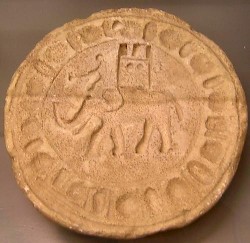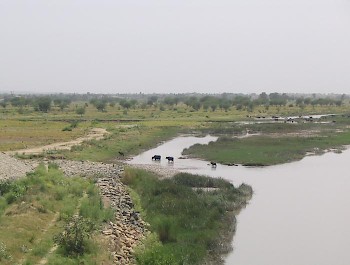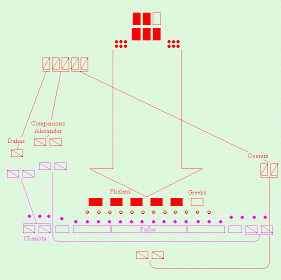Porus
Porus (Old Indian Puru): king in the eastern Punjab, defeated in 326 BCE by Alexander the Great.

The Greek/Latin name Porus is a rendering of the Indian Puru, the throne name of the ruler of the kingdom Paurava. This state was situated between the rivers Hydaspes (modern Jhelum) and Acesines (Chenab). Its capital may have been at the site now known as Lahore.
When the Macedonian conqueror Alexander the Great arrived in India in the spring of 326, he was welcomed by Omphis, the king of Taxila (Takshaçila, near modern Rawalpindi), another kingdom in the Punjab and Porus' archenemy. To Porus, the arrival of the westerners was a great threat: after all, it was obvious that Omphis would use his allies in a war against Paurava.
However, for the time being, he seemed safe, because the approaching monsoon rains would make it impossible to cross the Hydaspes. Therefore, he refused to send envoys to Taxila to offer tokens of submission. This was a grave error, because Alexander wanted to conquer all of India. In May, the Macedonian army started to march to the Hydaspes.

Porus was prepared for war. With his army, he had taken up a position on the east bank, intending to prevent Alexander's crossing. A bit more to the north, one of his sons was guarding the river, to make sure that Alexander would not outflank the Pauravans. As it turned out, Porus' son was no match for the Macedonians: during a thunderstorm, they crossed the Hydaspes, and the Indian chariots were unable to move through the rain-soaked mud. He was defeated and killed, and Alexander started to move against the army of his father.
The Indians were outnumbered and outclassed by the Macedonian army. However, Porus still had one dangerous weapon: the elephants, an army unit that the Macedonians had never encountered before. He placed these animals before his infantry men, knowing that the Macedonian cavalry could not attack them because horses fear elephants unless they have had a special training. On his wings, the Pauravan king stationed his chariots. When the Macedonians reached the place where he was waiting for them, they deployed their phalanx and moved slowly towards their enemy. Alexander commanded the heavy cavalry and the mounted archers of the Dahae, which were on his right wing.

Porus saw that his left wing chariots were outnumbered by the Macedonian cavalry and moved his right wing chariots to the left; at that moment, the Macedonian cavalry commander Coenus suddenly moved to the now undefended Indian right wing and encircled the enemy lines, attacking them in their rear. Meanwhile, the heavy cavalry in Alexander's neighborhood and the Dahae were victorious against Porus' chariots, and archers were attacking the elephants. The Macedonian archers and phalanx started to kill the elephants' drivers and the animals panicked. From this moment on, the Indians were attacked from all sides: they had to defend themselves against the phalanx and their own elephants in front of them and the Macedonian cavalry in the rear. Nearly all Indian cavalry were killed; a few infantry men managed to flee; a wounded king Porus surrendered only after the destruction of his entire army. When Alexander asked him how he wanted to be treated, he gave the famous reply 'as a king'.
Porus had behaved like a king indeed and Alexander could appreciate this. The Indian leader accepted his defeat and was reappointed as satrap of his own kingdom. Omphis of Taxila must have been disappointed that he was forced to reconcile with his enemy; after all, he had invited Alexander to fight against his eastern neighbor. He had to accept an even more humiliating fact: Porus received additional territories to the north of his kingdom.
However, not all Indians accepted that they were now subjects of the westerner. A relative of Porus declared himself king of Paurava (and was consequently also called Porus) and continued the struggle in the eastern part of the country. When Alexander's army started to march against him, he fled, probably to the kingdom of Magadha in the Ganges valley.
Alexander intended to conquer Magadha, but his men refused to go any further (text), and the Macedonian king announced the return. This meant that Porus was to be the leader of a border satrapy, an exceptionally important function.
Three years later, when Alexander was dead and the territories were divided by his successor Perdiccas, Porus was recognized as defender of the eastern border (text), under the supervision of the satrap Peithon of the Punjab. He was still in function when the satrapies were divided for the second time after the death of Perdiccas (the settlement at Triparadisus).
In 317, one of Alexander's successors, Peithon the satrap of Media (not to be confused with the former Peithon), tried to subdue the leaders of the eastern provinces. The other satraps united and offered resistance. One of them was Eudamus, the commander of the Macedonian forces in Taxila. In order to procure Porus' elephants, he had him murdered.
After the removal of a loyal ruler and his troops, it became possible for the king of Magadha, Sandracottus (Chandragupta Maurya), to conquer the Indus valley. This meant the end of the Macedonian empire in the east, less than ten years after the invasion.
In the 1960, an Indian scholar named Buddha Prakash argued, basing himself on the famous medieval epic named Shahnameh by the Persian poet Firdowsi, that Alexander was defeated' by Porus, that the two men became friends, and that this explained why Alexander left him so much territories. This theory, which has been revived in Pakistan in the 1990s, cannot be accepted as serious scholarship, but Prakash was right to stress that Porus, who had suffered a terrible tactical defeat, was in the long term the real victor.